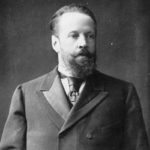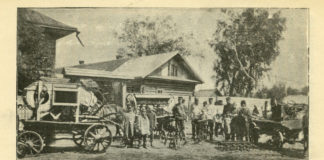 Sergei Yulievich Witte, the eminent Russian statesman, economist and a member of the Imperial Free Economic Society, was born in Tiflis on June 17, 1849, 170 years ago. Describing Witte’s activities another prominent member of the VEO, P.B. Struve, wrote: “The economic genius of Witte should be sought not in poor treatises on political economy, written by someone else’s hands, but in a statesman’s creativity, free from the fetters of doctrines and solving with a tremendous ease the difficulties that baffled sages and scholars.”
Sergei Yulievich Witte, the eminent Russian statesman, economist and a member of the Imperial Free Economic Society, was born in Tiflis on June 17, 1849, 170 years ago. Describing Witte’s activities another prominent member of the VEO, P.B. Struve, wrote: “The economic genius of Witte should be sought not in poor treatises on political economy, written by someone else’s hands, but in a statesman’s creativity, free from the fetters of doctrines and solving with a tremendous ease the difficulties that baffled sages and scholars.”
Ultra-Russian, ultra-noble and ultra-monarchistic
Pyotr Berngardovich Struve’s words quoted above are all the more valuable because the liberal economist and legal Marxist gave such a characteristic to a person who had been described as ultra-Russian, ultra-noble and ultra-monarchistic. Of course, Witte was entitled to all those “ultras” by birthright.
Here is what Witte himself wrote about those circumstances in his memoirs: “My father, Yuli Fyodorovich Witte, was the Director of the Department of State Property in the Caucasus. Mother, Ekaterina Andreevna Fadeyeva, was the daughter of a member of the Main Board of the Viceroy of the Caucasus, Fadeyev. Fadeyev was married to Princess Yelena Pavlovna Dolgoruky, the last representative of the older branch of the Princes Dolgoruky descended from Grigori Fyodorovich Dolgorukov, a Senator under Peter I, brother of the famous Yakov Fyodorovich Dolgorukov.”
In 1866, Sergei enrolled at the Novorossiysk University in Odessa, the Faculty of Physics and Mathematics. He studied with enviable diligence, standing out among his comrades and commanding respect among the faculty for his numerous successes. “… I worked day and night,” he recalled, “and therefore all my time at the university I was really the best student in the sense of knowledge.” He contemplated a career in research and teaching and, having completed the university course, he prepared a thesis in higher math entitled “On Infinitesimal Quantities”.
The family disliked Sergei’s plans regarding his academic career, considering it to be an occupation unfit for a nobleman, unlike the public service which could win him a firm position in society. Family matters interfered as well. While he studied at the university, both of the Fadeyevs, grandfather and father who was only 50 years old, died. They had unsuccessfully invested money in the Chiatura Mining Company which went belly-up, and the family was left without means of livelihood. Sergei was supposed to take on a share of responsibility for his mother and two sisters. At that time, a young specialist could get a good starting salary only in the high-tech sector, railroading. Sergei had help from the Minister of Ways of Communication V.A. Bobrinsky, a good friend of grandfather Fadeyev; he was just looking to recruit a group of mathematicians – university graduates to serve in his ministry, hoping to make them specialists in railway finance.
By rail to science
During his fifteen years in railroading, Witte rose through the ranks from a ticket teller (he himself decided to start from this minor position to gain experience) to the manager of the Southwestern Railroads. The railway tariffs became his specialty: a candidate of mathematics, he remembered by heart whole tables of numbers and subsequently wrote a study on the basic principles of tariff formation.
At the same time, Witte pondered theoretical problems, read the classics of political economy, and finally, in 1889, published the book National Economy and Friedrich List. Witte believed that Russia had its own way in terms of economy. In List’s theory, attention was paid to national peculiarities of economic systems. Promoting List’s teachings, Witte emphasized he did not deny the conclusions of Adam Smith and David Ricardo. However, in his opinion, the creators of classical political economy had created a science that was in fact cosmopolitan, rather than political, economy. Meanwhile, life itself was refuting the universality of their axioms on the daily basis, and facts proved every national economy had its own way, unique in many aspects.
Witte marveled at doctrinaires who intended to carry out reforms relying on political economy textbooks. “We, Russians,” he wrote sarcastically, “went in tow of the West in the field of political economy, of course, and therefore given the groundless cosmopolitanism that reigned in Russia in recent decades, it is not surprising that the meaning of the laws of political economy and their everyday understanding took a ridiculous twist in this country. Our economists conceived of the idea of cutting the economic life of the Russian Empire to the recipes of cosmopolitan economy. The results of this cutting are obvious.” Witte’s main conclusion: the general economic principles must necessarily be “modified according to differing national conditions”.
The economic views of the manager of a privately owned railroad would be of no importance if it were not for one circumstance. Just a few months after Witte found it necessary to systematize his views, he began his career as a statesman, and his economic credo soon became the basis of the government policy.
“They will get the sovereign’s neck broken…”
A sharp turn in Witte’s career was largely due to chance. As the manager of the Southwestern Railroad he had the audacity to limit the speed of the royal train, causing outrage among the courtiers. “They will surely get the sovereign’s neck broken,” he replied to his opponents in the presence of the tsar. On the other railroads, the managers were less obstinate, and the train was usually driven by two locomotives at a breakneck speed until a disaster occurred near Borki train station. The emperor Alexander III’s family was saved by a miracle. That was when he remembered Witte’s warning.
In March 1889 Witte was appointed director of the department of railway affairs and, contrary to all the canons of the Table of Ranks, he was immediately promoted to the rank of actual state councilor equated to a general’s rank.
When appointed to that position, Witte had a personal conversation with the sovereign. Alexander III, knowing that because of his transition to the civil service Witte would lose two thirds of his salary, ordered that in addition to the official government salary he be paid another one of the same size from the coffers of the imperial family.
On January 1, 1893, Alexander III appointed him Minister of Finance with simultaneous promotion to the rank of secret councilor. Witte’s 43 year long career reached its peak.
In today’s Russia, one ministry is responsible for agriculture, another for industry, and a third for economy. In contrast, Witte, being the Minister of Finance, was in charge of everything: besides finance, he was put in charge of the department of railway affairs, trade, industry, and agriculture; He was able to influence the resolution of the most important issues. Yesterday’s Panslavist, Slavophile, and a staunch supporter of Russia’s own way of development was rapidly turning into a European-style industrializer and proclaiming his willingness to bring Russia into the fold of advanced industrial powers in a short time.
The post of the Minister of Finance was not the end of Witte’s political biography; having stepped down in 1903, Sergei Yulievich did quite a lot of good for Russia, but in this essay our intent is to examine Witte’s economic views, so we will look into them leaving aside the further chronology of his life.
Monetary reform
Among Witte’sreforms, the most effective and complete was the experience of stabilizing the Russian ruble. It took a long time, approximately 15-17 years, to prepare a monetary reform in Russia. A significant contribution to its implementation was made by the previous finance ministers, M. Reitern, N. Bunge and I. Vyshnegradsky. Witte continued and completed their work. Circumstances favored the new minister: industry was on the rise; the process of railway construction proceeded at a rapid pace; the trade balance had a steady surplus. By the time the monetary reform began, the government’s gold reserves had doubled to 645.7 million rubles.
In response to the high import duties imposed on Russia’s grain exports, Witte passed a law through the State Council, according to which minimal tariff rates were applied only to those countries which adhered to the most favored regime in relations with Russia. Germany, the main consumer of Russian grain, did not adhere to such a regime, and its exports to Russia were subject to an increased state duty. Germany was forced to make concessions. In 1894, a new trade agreement was made.
In March 1896, Witte presented the final draft of the monetary reform to the Finance Committee, and in April to the State Council.
Witte’s Monetary System:
The newly minted gold coin was to become Russia’s main coin and legal tender; gold coins minted according to the 1885 law were accepted for all payments until their withdrawal from circulation at the rate of 1 ruble = 1 ruble 50 kopecks of the new coinage;
State credit notes represented legal tender and were included in bank’s liabilities; they could be exchanged for gold at the rate of 1 ruble 50 kopecks in credit notes per 1 ruble in gold, or 66 ½ gold kopecks per one-ruble credit note, which corresponded to the average exchange rate of the ruble and the liability balance ratio established in the years before the reform;
The emission of credit notes was carried out by the State Bank only for the bank’s commercial operations, credit notes were 50% gold-backed up to 1 billion rubles, and 100% gold-backed in excess of 1 billion rubles;
All obligations under government and private loans in metal rubles which arose prior to the enactment of the law remained unchanged, i.e. were subject to repayment in new rubles at the rate of one and a half times their previous value.
Although the main provisions of the project were approved by the Finance Committee, they were met with almost unanimous disagreement in the State Council. In such a situation, Witte decided to bypass the State Council and appeal directly to the tsar. It worked.
The first law “On Minting and Putting Gold Coins into Circulation” was signed by Nicholas II the day after the meeting, on January 3, 1897. Released were ten-ruble gold coins, dubbed Imperials, equaling 15 rubles in credit notes, and 5-rubles, Half-Imperials, equaling 7.5 rubles in credit notes. The next act was the August 29, 1897 decree on the fundamentals of issuing credit notes. Compared with the previously proposed 1 billion-ruble issue of 50% gold-backed credit notes, the amount was reduced to 600 million rubles. Finally, on August 27, 1898, a decree was signed on the fundamentals of silver coin circulation. The silver coin was assigned the role of ancillary money, which was a kind of concession to the adherents of bimetallism.
The reform was not confiscatory in character, as it often happened in the history of Russia, and was as comfortable as possible for the people: in fact the market exchange rate between the treasury bills and their gold content remained the same. There was no replacement of currency, recalculation of prices and obligations.
The monetary reform was being implemented amidst strong controversy between its supporters and opponents. The reform was supported by representatives of industry and commerce. The ruble stabilization measures and the banknote coverage system coincided with the completion of the formation of the Russian national marketplace and the emergence of financial capital. The process of the merging of industrial and banking capital began.
Gentry and kulaks opposed the monetary reform. The reform deprived them of cheap Russian money which they used to pay off their workers while selling their grain abroad for expensive European gold.
Industrial policy
During the industrial rise of the 1890s, which coincided with Witte’s active period, industrial production practically doubled, about 40% of the enterprises active at the beginning of the 20th century were put into operation, and as many railways were built including the great Trans-Siberian Railway, to the construction of which Witte made a considerable personal contribution.
Railway construction was carried out both by the government, which took upon itself the construction of lines of strategic importance, and private companies. Over the 10 years of Witte’s stint as the Minister of Finance, the length of railway lines almost doubled – from 29.4 thousand to 54.2 thousand miles. The railway industry became an effective instrument of economic growth. It greatly reinforced the mobility of the population, which made it easier for the manufacturing industry to hire workers and contributed to the growth of cities at the expense of the countryside.
Witte’s achievements included the streamlining of the tariff policy, in which he was an outstanding specialist. The ability to pursue a policy of sustainability of tariff rates indicated that the rates were being correctly determined. The lowering of passenger tariffs, especially over considerable distances, contributed to the development of passenger transport by reducing its losses.
As a result, Russia, in terms of its most important economic indicators, closed the gap separating it from the leading capitalist countries, taking fifth place in global industrial production, almost equaling France. But nevertheless, it still significantly lagged behind the West in absolute terms, especially per capita consumption.
Witte paid much attention to training specialists for industry and commerce. By 1900, three polytechnic institutes and 73 commercial schools were established, several industrial art institutions were established or reorganized, including the famous Stroganov School of Technical Drawing, 35 merchant shipping schools were opened.
Labor law
The growth of the workers’ strike movement prompted the government to improve the factory legislation. With the active participation of Witte, laws were written and adopted on limiting the working hours in enterprises (June 2, 1897), on remunerating workers who lost their ability to work as a result of an industrial accident (June 2, 1903), on introducing factory supervisors (June 10, 1903). Witte introduced the institution of factory inspectors, who supervised both the technical condition of production facilities and the implementation of the labor regulations and the health and safety laws.
Agricultural transformation
Having become the head of the Special Council on the Needs of Agriculture in 1902, Witte was able to gain a deeper understanding of the peasant question and to outline the possibilities for its solution. The tsar approved the network of provincial and district committees established under the Special Council. A total of 82 provincial and regional committees and 536 district and circuit committees were created, with the membership of nearly 12,000 people. The committees were dominated by gentry: their share was 66% in the provincial committees (with the share of peasants being 2%), 52% of members of the district committees were gentry and government officials, with the share of peasants being 17%.
Summing up the work of the Special Council, Witte admitted that “the prosperity of the agricultural sector depends in the closest way on whether our peasantry’s legal status is capable of promoting the spirit of economic enterprise and initiative within its ranks; without that, as well as without the education of the peasantry, any sorts of measures in the field of agricultural economy and technology will bring, in the opinion of the committees, only an insignificant benefit.”
The main obstacle to such a transformation was the preservation of the peasant community. At the same time, Witte, maneuvering between tradition and the need for transformation, delicately emphasized that «the principle of the inviolability of the peasant community must be combined with the possibility for individual peasants to leave it.»
Summarizing the proposals of the committees created under the Special Council, Witte emphasized that instead of preventing the development of proletarianization, the community accelerated it. Temporary land use brought up the most destructive methods of farming (they boiled down to the “plow as much as possible, and come what may” principle), the forage lands were being destroyed, and what remained was deprived of any care. Calling for the free separation of peasants from the community, Witte argued it was advisable for the government and society to support peasants who were leaving the community.
However, the measures for a new arrangement of peasant life outlined by Witte, albeit in a rather delicate manner, were opposed by gentry. Witte was removed from directing the work of the Special Council. In 1903, that same year, Witte was dismissed from the post of Minister of Finance. Eighteen months later Pyotr Stolypin set about implementing the proposals that had been laid down and substantiated by Witte. Therefore, Witte always believed that Stolypin had “robbed him” and could not write about him without personal dislike.
“… Stolypin,” wrote Witte in his Memoirs, “had an extremely superficial mind and an almost complete absence of culture or education a statesman should possess. By education and intelligence … Stolypin was a type of bayonet-junker.”
Count Half-Sakhalin
After the humiliating defeat of Russia in the Russian-Japanese war of 1904-1905 Witte was appointed the first authorized representative for negotiating with the Japanese. The negotiations took place in Portsmouth, United States of America, in August 1906.
Witte had to display considerable diplomatic skill to minimize Russia’s losses. In fact, at the negotiating table Witte even managed to return part of what had been lost in battle. And still, he had to agree to the concession of South Sakhalin, already captured by the Japanese.
After the signing of peace, Sergei Yulievich was granted the title of count, but his enemies immediately dubbed him “Count Half-Sakhalin”. Witte himself wrote in his memoirs: “The only significant concession that was made, in the sense of the Sovereign’s instructions given to me, was the concession of South Sakhalin, and the Sovereign himself made it. That honor belongs personally to His Majesty…»



